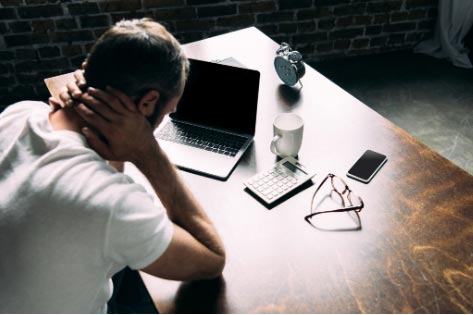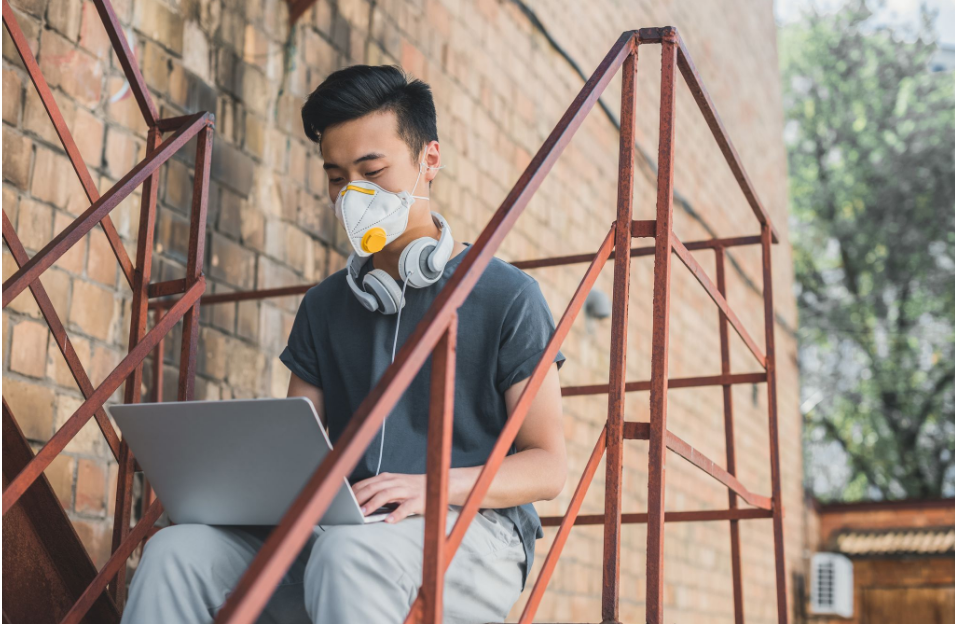Mental Health Considerations during COVID-19 Outbreak
COVID-19 is a new respiratory illness that has been affecting more than 200 countries in the world since December 2019, taking the lives of almost 260,000 people.
Many changes occur in our lives during a pandemic, and we must adjust our routines to the new reality. Most of our favorite restaurants and bars are closed; for some people, grocery shopping has become a hassle due to long lines and empty shelves at stores; and citizens of certain countries must fill out forms to even walk out of their houses. People in different parts of the world need to self-isolate and distance themselves from others. COVID-19 has been affecting not only the infected patients, but the mental health of those who must stay inside, change their lifestyles, and take measures to stop spreading the virus.
How Does COVID-19 Affect Our Mental Health

The way the pandemic affects one’s mental health depends on different circumstances such as their living situation, employment, family, mental health background, etc. But the excessive worry about our health and the health of our loved ones may worsen anxiety and depression among all of us. Concerns about illnesses exist even in no-corona reality, but now we keep looking at the numbers on the internet, turn on the TV and hear about increased patients with COVID-19, and think we could easily be one of the infected – which is, unfortunately, true.
Although feeling afraid and anxious is normal during the disease outbreak, just like in any other situation, if worry changes anything, it’s by making things worse. Stress can weaken our immune system and make us more vulnerable to the virus. That’s why it’s crucial to reduce the stress we might be experiencing, and the best way is to follow the guidelines from the CDC to prevent getting sick. CDC recommends taking steps such as washing hands frequently, avoiding close contact with people who are sick, keeping distance from others, and cleaning and disinfecting surfaces.
But the reason behind our anxiety and depression is not only the risk of getting infected with the new virus.
Changes in Our Routines and the Ways to Deal with Them

COVID-19 has been changing airplane routes, canceling events, and keeping us behind shut doors. If you are among the lucky ones who made it back home safely, then we can say you probably have to work from home. In some cases, people remain far from home because of travel restrictions and flight cancellations. In any scenario, we assume you can no longer follow the routine you have been living with for several years.
When reality changes, we must change our routines, too. Transformation may increase our stress levels, and we might lose the motivation to build a new plan for ourselves. However, it’s essential to have a schedule to maintain a healthy lifestyle, with or without the pandemic.
Although you probably cannot take the train to work anymore and can’t get lunch from your favorite restaurant down the street, you must think of the ways to craft a new daily plan that fits the new reality. According to a study, maintaining a daily rhythm is essential for mental health. Even if you don’t need to wake up early every day, setting your alarm at the same time each morning might help you reduce the risk of getting depressed during the pandemic. According to research, people who wake up early are less likely to develop mental health problems.
You might think, even if you wake up early, there is not much to do as you don’t have to leave for your office as you would typically do. The virus outbreak doesn’t mean our life has to become chaos.
Set your alarm early, get up, and make breakfast for you and your loved one or your family. Even if you live alone, nourish yourself with a healthy meal. Self-care leads to self-love, and you will improve your mood during the lockdown.
You might want to write down a list of activities you want to do every day. This can be reading a book for 30 minutes after breakfast or checking social media after having a cup of coffee. If you keep working remotely, then plan how many hours you will work each day. It’s also a great idea to eat according to a schedule. When you are at work, you have a lunch break at a particular time. But at home, the kitchen is right there, and you don’t physically need to go anywhere to get food. You may end up eating with no schedule, and that might lead to the feeling of lack of control and become a reason for your upset mood.
If you don’t have a schedule for your meals, this might also result in overeating or a reduced intake of food. For the best outcome, keep eating meals at the same time every day. Keep the distractions such as phone and laptop away while enjoying your meal.
Increased Exposure to the News May Cause Anxiety

Now we are all united by the same worry about the new virus taking the lives of thousands around the globe. We keep looking at the information about the new virus daily – which is necessary to stay up to date. But the increased exposure to such stressful news can be upsetting for anyone regardless of age, gender, or nationality. Because we live in a world with social media and the internet, we have limitless access to the news. It’s not the same as back in the day when we would take a seat on a sofa to watch the evening news with our families.
Opening social media nowadays is almost the same as watching the news on TV. When there is a pandemic happening, most of the people share news regarding it. And so when we open our accounts and scroll on the newsfeed 20-25 or more times per day, it’s almost the same as taking a seat at the sofa for 20-25 times per day to hear some worrisome news about the current situation. It’s another reason for your body to produce more cortisol, the stress hormone.
While it’s essential to stay up to date about the outbreak, it’s vital to limit checking the information per day. The World Health Organization suggests seeking the information at specific times during the day, once or twice.
“The sudden and near-constant stream of news reports about an outbreak can cause anyone to feel worried.”
– The World Health Organization.
Less Physical Activity May Increase Stress

The government’s advice to stay home will lead us to less physical activity. You probably used to walk to your work, ride a bike, or even walk to a station to take a ride. Now, all you have to do to get to work is to get out of your bed. Reduced physical activity might increase the level of stress and anxiety and harm your health in general. And on the other hand, increased physical activity will reduce anxiety and depression.
“Increased levels of physical activity can significantly reduce the odds of depression, even among people who are genetically predisposed to the condition.”
– According to a study from researchers at Massachusetts General Hospital (MGH)
We aren’t saying we should disobey the social distancing rules and storm into gyms, but increasing the physical activity at home will help you in coping with the stressful situation. There are thousands of fitness videos on YouTube on stretching, yoga exercises, full-body workouts, leg workouts, abs workouts, etc. There are numerous fitness instructors you can follow for daily exercises that you can do without physically going anywhere. All you need is a mat on the floor. Even if you don’t own a workout mat, you can use a rag, cloth, or do workouts on the bare floor.
High Exposure to Electronic Devices May Increase the Risk of Depression and Anxiety

Now we do our work using the internet, connect using social media, and check the news on our phones – all this leads to the increased exposure to our electronic devices. While it’s reasonable to use our gadgets to stay up to date and connected, the increased use of electronic devices may increase the risk of depression and anxiety, this study shows.
Now it’s best to find pastime activities that do not involve a screen, as you need to spend all day using it. Try to read a book in the evening to entertain yourself and take a break from the virtual world. Try to paint or draw.
Writing a diary is also a good idea as it is a wonderful way to cope with fear and stress. A diary can help you express yourself and improve your mental health.
“Keeping a journal helps you create order when your world feels like it’s in chaos. You get to know yourself by revealing your most private fears, thoughts, and feelings.”
– University of Rochester, Medical Center
Stay Connected

Although we recommend decreasing the exposure to your electronic devices, it’s essential to stay connected with your family and friends. Social interaction is crucial for mental health, especially during difficult times. Find ways to reach people, either via email, phone, audio calls, video conferencing apps – whatever works best for your situation.
“People who are chronically lacking in social contacts are more likely to experience elevated levels of stress and inflammation. These, in turn, can undermine the well-being of nearly every bodily system, including the brain.”
– The New York Times
Get Enough Sleep

Getting enough sleep is crucial at any stage of our lives, especially during stressful situations. A good sleep schedule will help reduce the risk of mental illnesses and reduce stress. Poor sleep is associated with a weakened immune system and mental health issues such as anxiety and depression.
“Sleep is as important to our health as eating, drinking, and breathing. It allows our bodies to repair themselves and our brains to consolidate our memories and process information.”
– Mental Health Foundation
Stay Positive
And finally, stay positive and optimistic. Although it’s difficult to have optimistic thoughts during such tough times, we have to believe better days are coming and we need to have a positive outlook on the world. Things like epidemics happen from time to time, and although there is not much we can change, we can stay positive to support others and keep our mental health in its best shape.
To reduce the negative effect COVID-19 outbreak may have on your mental health:
- Create a routine during the outbreak
- Limit your exposure to news to once or twice a day
- Stay physically active even at home
- Reduce the use of electronic devices
- Stay connected with family and friends
- Get enough sleep
- Stay positive





